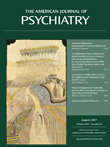The Relationship Between Obesity and Drug Use
To The Editor: The article by Melissa A. Kalarchian, Ph.D., et al. (1) , published in the February 2007 issue of the Journal, reported that there is a prevalence of DSM-IV psychiatric disorders among bariatric surgery candidates, which is associated with greater obesity. The authors noted a “striking” discrepancy between lifetime substance use disorders (32.6%) compared with current use disorders (1.7%). They suggested a potential underreporting to explain the difference, but they also suggested an inverse relationship between overeating and drug use, citing the study by Volkow and Wise (2) on food- and drug-reward systems in the brain.
Our work is consistent with the latter suggestion of foods and drugs competing for reward sites in the brain. Overeating and obesity may in fact act as protective factors against drug reward and addiction. In similar patient populations, we found an inverse linear relationship between obesity and alcohol use (3) . Additionally, as body mass index increased, the percentage of women who consumed alcohol in the past year decreased significantly. Similarly, as body mass index increased, the percentage of women who used marijuana in the past year significantly decreased (4) . These findings are particularly interesting with the facts that alcohol and marijuana act as appetite stimulants in the acute intoxication setting.
The relationship between foods and drugs in the brain in competition for reward is complex. Hypothesis-driven research should be conducted in this area to explore possibilities for combating obesity and drug addiction.
1. Kalarchian MA, Marcus MD, Levine MD, Courcoulas AP, Pilkonis PA, Ringham RM, Soulakova JN, Weissfeld LA, Rofey DL: Psychiatric disorders among bariatric surgery candidates: relationship to obesity and functional health status. Am J Psychiatry 2007; 164:328–334Google Scholar
2. Volkow ND, Wise RA: How can drug addiction help us understand obesity? Nat Neurosci 2005; 8:555–560Google Scholar
3. Kleiner KD, Gold MS, Frost-Pineda K, Lenz-Brunsman B, Perri MG, Jabocs WS: Body mass index and alcohol use. J Addict Dis 2004; 23:105–118Google Scholar
4. Warren M, Forst-Pineda K, Gold M: Body mass index and marijuana use. J Addict Dis 2005; 24:95–100Google Scholar



